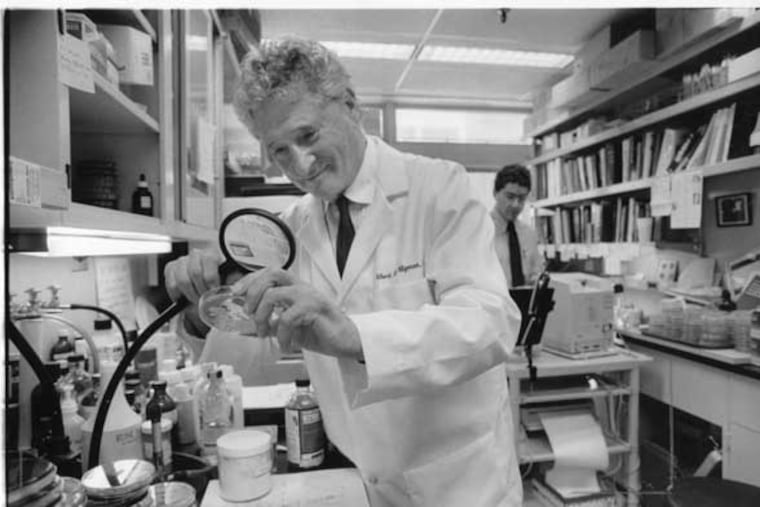City owes apology to families of Black men abused by notorious Penn doctor | Opinion
The University of Pennsylvania recently apologized for the sins of Albert Kligman, but why hasn’t the city done anything to atone?

On Aug. 20, the University of Pennsylvania issued an apology concerning Albert M. Kligman, a longtime faculty member and esteemed dermatologist at the medical school whose controversial research included both groundbreaking contributions and terribly disrespectful research procedures practiced on imprisoned Black men.
The Penn apology admitted the famous physician, whose portfolio contains the lucrative Retin-A cosmetic line, denied his research subjects “the autonomy and informed consent which the medical community now considers to be foundational underpinnings for conducting ethical research.” Such practices, it went on to state, are “not now, and never were, morally acceptable.”
» READ MORE: Penn Medicine apologizes for notorious doctor who conducted experiments on Holmesburg Prison inmates
Ten years after Kligman’s death and over two decades after the full gamut of his exploitative research practices were illuminated, it is now time for the City of Philadelphia to apologize. Without the city’s approval, Kligman and Penn would have never been able to use Philadelphia’s criminal justice system as an adjunct of its medical school, and a private stable of cheap and available test subjects.
Fifty years ago this month, I walked into the city prison system, which included at the time Holmesburg, House of Correction, and Detention Center. Hot, raucous, and overcrowded that September day, each institution showcased a number of sights, sounds, and behaviors that would shock average Philadelphians. Perhaps the most unusual was hundreds of inmates adorned with bandages, gauze pads, and medical tape. Though prepared to work in an urban jail, I was stunned to discover I had also entered the nation’s largest clinical trial factory.
Inmates desperate to earn money were recruited by doctors and other inmates hired by Kligman to “sell a piece of their skin” for what was pitched as innocuous soap, hair dye, and athletes foot medications; swallow an assortment of “diet pills;” injected with “vitamins;” and participate in what was described as rudimentary academic studies. The dollar-a-day reward meant a trip to the commissary, money to send home, down payment for an attorney, or in a few cases, bail money.
Kligman compartmentalized much of his operations, leaving inmates, and even some doctors and technicians, in the dark about the experiments not only on Phase I drugs but also radioactive isotopes, dioxin, and chemical warfare agents. Many people involved did not know the extent of Kligman’s business interests and therefore could be working alongside a dangerous dioxin experiment and never have knowledge of it.
Kligman, an accomplished conniver and entrepreneur, was open to any public or private entity proffering financial reward. The word got out and business was good. Dow Chemical, R.J. Reynolds, Johnson & Johnson, the U.S. Army, and dozens of others all came calling. Philadelphia developed the reputation amongst those in the business of human experimentation as the place to go if you had a risky clinical trial needing test subjects.
» READ MORE: My family needs more from Penn than an apology for unethical medical experiments | Opinion
This was well after American jurists at the Nuremberg Trial of Nazi doctors set down 10 principles for future researchers, the most important of which for this issue stated that a test subject should have “the free power of choice, without the intervention of any element of force, fraud, deceit duress … or other ulterior form of constraint or coercion … and should have sufficient knowledge and comprehension of the elements of the subject matter involved as to enable him to make an understanding and enlightened decision.” In this — the protection of prisoners — Penn and city prison administrators failed miserably.
There is little evidence that the many mayors and City Council members who served over the course of Kligman’s prison research empire — a period that stretched from the early 1950s to the mid-’70s — knew anything about the enterprise, even though this was happening in city-run facilities. Elected officials and city administrators neither knew nor sought to know; those celled along Torresdale Avenue and State Road in Northeast Philadelphia — both the accused and convicted — were the devalued. The flotsam and jetsam at the bottom of the socioeconomic applecart, they were expendable and not worth protecting.
Kligman, however, knew a good thing when he saw it and found the “acres of skin” locked behind cell bars of tremendous value. He took advantage of the city’s lax oversight and general disinterest in the motley collection of humanity he had been fortunate enough to come upon. Many of those accused and convicted of crimes in the city’s criminal justice system would not only be sent to prison but “sentenced to science” as well.
An apology from city officials is now in order. There are many precedents for such a governmental overture, but maybe the best is President Clinton’s statement to the survivors of the infamous Tuskegee syphilis study. At a sobering White House ceremony in May 1997, President Bill Clinton stated, “The people who ran the study … diminished the stature of man by abandoning the most basic ethical precepts. They forgot their pledge to heal and repair.”
The Tuskegee tragedy took place in the backwoods of Macon County, Ala. The Holmesburg travesty occurred in the then-third-largest city in the nation, a city that once billed itself as the Athens of America. It’s an indictment of the whole city that it lasted for 25 years. An apology is in order, ideally from Mayor Jim Kenney, or City Council President Darrell L. Clarke, if the mayor does not want to step up, to recognize this grievous error.
Allen M. Hornblum has authored numerous books on Philadelphia history, including “Acres of Skin” and “Sentenced to Science.”